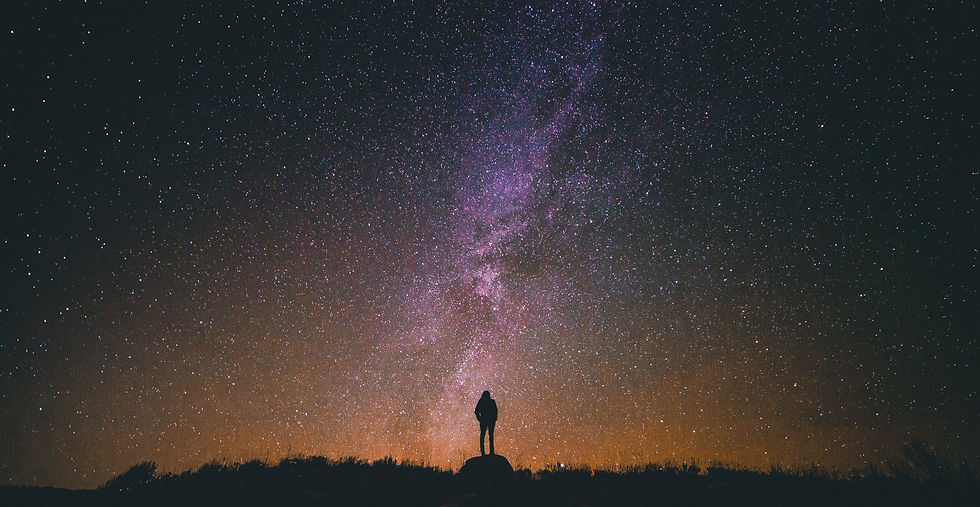Orbiting Into A Dangerously Dystopian Future: The Consequences Of Astronomical Advertisements
- Jess Wileman
- Oct 17, 2020
- 3 min read
Russian company StartRocket plans to deploy their first ‘Orbital Display’ in 2021, with the aspiration of reaching 7 billion customers. Visible for 24 hours a day, the dystopian floating advertisements reflect light from the sun to display ‘entertainment’ messages from space to earth.
As a result of their ‘Orbital Display’ project attracting a significant amount of constructive criticism, StartRocket now plans to launch another new venture which involves pioneering their Foam Debris Catcher (FDS). These small spacecrafts release a special foam which rubbish sticks to in order to reduce space pollution.
StartRocket state that their goal as a company is allegedly to create a safer space environment within an era of ‘conscious consumption’ (source: https://startrocket.me/). But how conscious is the consumption implemented with their ‘Orbital Display’? We already exist in a commodity-saturated environment. As Mike Featherstone notes, ‘aestheticisation of reality’ has created a consumer culture whereby the market has the ability to shape societal desires from their advertisement of goods and services (Featherstone, M. (1990). Perspectives on Consumer Culture. Sociology, 24(1). 5-22).
At present, consumption is a driving force behind our lifestyle choices, relationships, and social life. When I interviewed Steve Hollyoak, the Managing Director of McCann advertising, earlier this year, he stated that that the most valuable ‘social currency’ we own as a consumer is our privacy:
‘it [our privacy] is the most valuable thing that you can control - to an extent.’
Could the inability to simply switch off or put down the StartRocket orbiting billboards be seen as invasive? Does it take away the consumer’s right to choose when to engage with advertisements?
Consumer culture as we know it is already extremely harmful; as academics suggest, it decentralises our norms and values. Our consumption-centred society has a tremendous effect on the growth of several social discrepancies, our physical health, and our mental wellbeing. However, the most prominent and prompt impact of consumer culture is on the environment, and StartRocket’s plans make no exception. Astronomer Kelsey Johnson previously expressed her concerns regarding light pollution and orbital material in a TED talk in 2019 (https://www.ted.com/talks/kelsey_johnson_the_problem_of_light_pollution_and_5_ridiculously_easy_ways_to_fix_it#t-765227). She explained how light pollution and orbiting technology make the work of astronomers increasingly difficult, disrupting their ability to conduct scientific investigations. What’s more, she argues that the light pollution produced by orbital technology and artificial light on earth can destabilise both animal and human ecosystems, and may even cause obesity and cancer.
Taking all of this information into account, it makes it increasingly difficult to view StartRocket’s innovative use of technology in a positive light. It begs the question of just how damaging the consequences of advertising in space could be for our ecosystems, society, privacy, and wellbeing.
This may seem like an exaggerated assumption, considering StartRocket doesn't intend to commercialise space via shuttle launch until 2021. However, with the coronavirus pandemic pushing societies around the globe to their limit, and the looming worry of an irreversible environmental crisis, should innovative technology be based around commercial capital?
Kelsey Johnson begs governments not to ‘auction off our view of the […] universe to the highest bidder to pollute at will’ and despite space advertising being outlawed in 1993 in the US, her fear may well become a reality (https://www.ted.com/talks/kelsey_johnson_the_problem_of_light_pollution_and_5_ridiculously_easy_ways_to_fix_it#t-765227).
For some, StartRocket’s orbital display would be a global declaration of cutting-edge technology. For most, it will simply be a floating reminder of a consumer culture which is, perhaps, pushing us even further towards an impending environmental disaster.

By Jessica Wileman
Image courtesy of Snapwire via Pexels




Comments